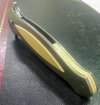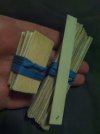- Joined
- Nov 27, 2013
- Messages
- 1,626
So I’m seeing pianos listed for free left and right in the free section on my local Craigslist. I know, I know, a lot of people will say, it’s not worth the effort. But let’s set that aside. I have two dollys, a trailer with a ramp, and a friend to help. It really wouldn’t really take much effort at all to pick it up. I’d wheel it into my garage, part it out, and then trash the unused parts. Don’t get me wrong, I don’t plan on destroying beautiful baby grand pianos for handle material. But if I can find a beat up old piano, that would cost a ton to repair, that has useable ivory keys, I might grab it up.
What is the best way to identify whether the keys are ivory or synthetic?
What’s the best way to remove the keys?
Also, has anyone here used piano keys on knife handles?
I was thinking about using them as inlays, bolsters, or possibly laminating some together to do a hidden tang block.
Any advice?
What is the best way to identify whether the keys are ivory or synthetic?
What’s the best way to remove the keys?
Also, has anyone here used piano keys on knife handles?
I was thinking about using them as inlays, bolsters, or possibly laminating some together to do a hidden tang block.
Any advice?


